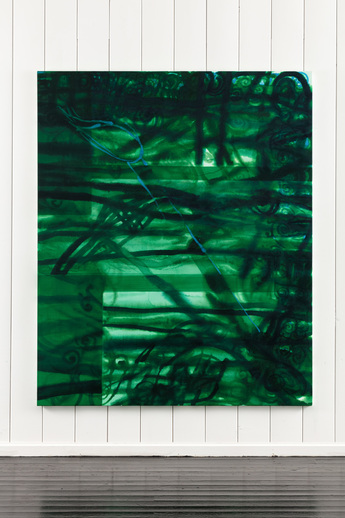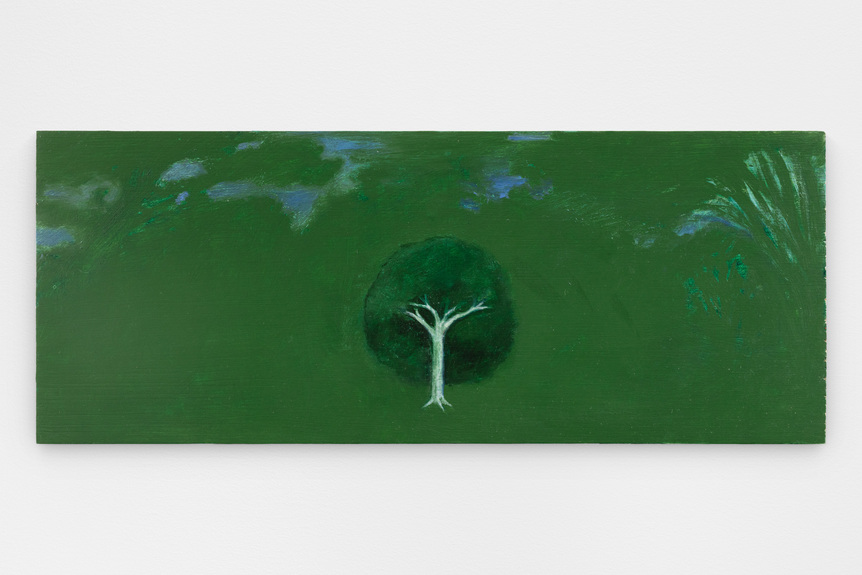-
From Current Issue
-
- Editor’s Letter Fire in the Heart
- Reviews I Gusti Ayu Kadek Murniasih
- Reviews 11th Seoul Mediacity Biennale: “One Escape at a Time”
- Dispatch Networked China
- One on One Monira Al Qadiri on Yukio Mishima
- Essays The rise of independent art spaces in pandemic-era Shanghai
- Features Tuan Andrew Nguyen
- Table of Contents
- Web Exclusives
- Archive
- Subscribe

R
E
V N
E
X
T
Installation view of BROOK HSU’s “Blue Bunny,” at Manual Arts, Los Angeles, 2021. All photos by Evan Bedford. All images courtesy the artist.
Brook Hsu’s paintings are so intently green that my first thought is of minerals—colors unadulterated and as old as time. Spirals, a recurring motif, lay like cobblestones beneath the malachite surface of several large shellac ink paintings; panes in varying hues further scaffold their depth. Figures emerge from the thicket no sooner than the bulky, blue-black lines Hsu soaks across the canvas. The overall surface appears thrashed, like water waiting to regain its reflection.
Titled “Blue Bunny,” Hsu’s exhibition at Manual Arts in Los Feliz, Los Angeles, alternates between these canvases and smaller-scale oil landscapes no bigger than a folded brochure. The latter paintings are so formal and contained, like illuminated manuscripts, they may appear out of place. What’s ultimately consistent, though, is the fervor carried by Hsu’s deft brushwork, rendering edges and images—and just as often redacting them—as if fulfilling an impulse to layer until the medium’s run out. Hsu’s technique is so direct and earnest, I couldn’t let go of one question for the artist: “Why are you making it so hard to see?”
“Blue Bunny” references a handful of films, including Takeshi Kitano’s A Scene at the Sea (1991) and Peter Greenaway’s The Pillow Book (1996) (after Sei Shōnagon’s 1002 tell-all of the Heian court). Hsu draws from the scenes of abandonment that figure in the films—an accompanying text by John Garcia cogently details her references—but the paintings are so washed over they embody compulsive, at times frustrated love, as opposed to explaining it. Hsu lets the liquid run its course in Hollow Reeds (2021); certain strokes bleed, their edges reminiscent of iron filings pulled to a magnet. A chalky, aquamarine sketch of a paintbrush bristles like a gas flame and slants across the surface. The paintings demand that you contend with their texture and presence first; the logic will follow.
The artist has a lighter touch, too. Blue Umbrella (2021) depicts a thinly painted young girl from Kitano’s film staring after the bygone possessions of her old lover—but that gaze is universal. Her features are exceedingly simple: rounded nose, double eyelids, wispy bangs. As in the labyrinthine abstractions, viridescent planes sink and float past her face, pulsing like the hidden colors in an Ad Reinhardt. There’s a vintage quality to the portrait, like looking at old photographs of your parents as you’re nearing the ages they were then. What lives were they living? If Blue Umbrella were a shade lighter, her face would dissolve into the bottle green background.
And the landscapes are peculiar for how descriptive, perhaps even obsessive, they are, as if excerpted from an absolutely still, rapt painting by Giovanni Bellini. Hsu paints the same, bushy orb of a tree in each one, modeled light falling precisely on mottled bark. Moving counterclockwise, the scenes get progressively saturated. In Tree in a Landscape 1 (2020), daylight is hinted by uncovered splotches of azure as edges blur into silhouettes; it’s unclear if the muscly strokes in the upper right are green-covered branches or just abstraction.
An unassuming little painting, Skeletons Embracing (2020), distills the ambiguous intensity of “Blue Bunny.” Pricks of lime green suffuse the space between their sockets, and patches of taupe have deadened the bushes. Technically the skeletons should be collapsed, a buckled pile of bones, but instead they kneel toward and prop each other up, helpless or hopeful. The poet Elizabeth Bishop has a line for this: “Love’s the son/stood stammering elocution/while the poor ship in flames went down.”
One gets the sense that Hsu is looking at things so intently one has no choice but to look as well. Her paintings feel so complete because of her focus. Attention and obliteration are key. Hsu’s descriptions transfix before they release, leaving the viewer wondering how real these scenes and landscapes could have been. At 2:50 pm on a Monday, a band of gold dust seemed to glitter across the top of the titular Blue Bunny (2021); perhaps it was something in the shellac. I took a picture, but it just wasn’t there the next time.
Brook Hsu’s “Blue Bunny” is on view at Manual Arts, Los Angeles, until April 25, 2021.
To read more of ArtAsiaPacific’s articles, visit our Digital Library.












